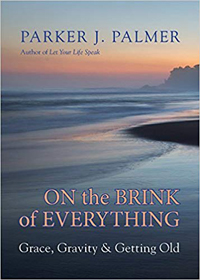 Parker Palmer, On the Brink of Everything; Grace, Gravity and Getting Old (Oakland: Berrett-Koehler Publishers, 2018), 198pp.
Parker Palmer, On the Brink of Everything; Grace, Gravity and Getting Old (Oakland: Berrett-Koehler Publishers, 2018), 198pp.
I've always appreciated Parker Palmer, and have reviewed three of his previous books here at JWJ: A Hidden Wholeness: The Journey Toward an Undivided Life (2004); Let Your Life Speak: Listening for the Voice of Vocation (2001); and The Active Life: Wisdom for Work, Creativity, and Caring (1990). Palmer is now eighty years old, and can look back over fifty years of reading, writing, thinking, and wondering about what Socrates called the examined life — a life well-lived, that silences the Total Noise, and that filters out the Endless Distractions of our culture. Palmer has always been about making a real life rather than making a mere living.
So, when I saw the subtitle of this book about "getting old" with grace, and since I am already old, I was eager to hear what Palmer had to say from his own age-n-stage perspective that is "on the brink of everything." Alas, I was mildly disappointed. This book is a collection of twenty-four previous essays, many of which appeared in his online weekly column for Krista Tippett's On Being Studios, along with some of his personal poetry. For example, there's a graduation speech, a letter he wrote to a friend, an essay on four ways that Thomas Merton helped him, and journal excerpts from an annual retreat that he takes in the Wisconsin winter.
Nonetheless, Palmer is always worth a read. He reminds me that a meaningful life cannot be reduced to a snappy elevator speech. As he does in all his books, sharing his own faults and failures, along with his experiences of three bouts of clinical depression, is disarming, and a reminder that true wholeness integrates one's brokenness. The contemplative life, says Palmer, cannot be reduced to any one technique, rather, it is "any way one has of penetrating illusion and touching reality." Most of all, Palmer encourages us to discover and to affirm our own unique sense of self and calling. Merton bemoaned how easy it is to lapse into "self-impersonation." In the world to come, says Rabbi Zusya, they will not ask me why I was not more like Moses, they will ask me why I was not more like my own true self (p. 75).
This book reminded me of another one like it, by Karl Pillemer, 30 Lessons for Living; Tried and True Advice from the Wisest Americans (New York: Hudson Street Press, 2011). Pillemer is a professor of human development at Cornell University who specializes in gerontology and founded the Cornell Institute for Translational Research on Aging. This book presents the results of a study in which Pillemer studied a thousand elderly people across five years, conducting over 10,000 interviews of various types. The book summarizes what he learned from these wise elders.
Dan Clendenin: dan@journeywithjesus.net


